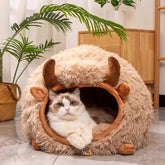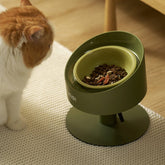Purrrfectly Safe: A Guide to Cat Litter and Its Safe Handling During Pregnancy

Are you a proud cat parent and expecting a new addition to your family? Congratulations! As you prepare for this exciting journey, it's important to ensure that you and your furry friend are both safe and healthy. One common concern for expecting cat moms is the risk of toxoplasmosis, a parasitic infection that can be found in cat feces. In this blog post, we'll explore the facts and fiction surrounding cat litter and pregnancy, as well as tips for safe handling and prevention. Don't worry, you don't have to give up your beloved feline friend – with the right precautions and expert advice, you can enjoy a safe and happy pregnancy with your furry companion by your side.
The Tale of Toxoplasma Gondii
Toxoplasmosis is a disease caused by the protozoal parasite Toxoplasma gondii. It is widespread among animals, birds, and humans worldwide. While it usually causes mild symptoms in cats, it is crucial to be aware of its health implications due to its potential to transmit to humans (zoonotic). Toxoplasma gondii is typically acquired through contaminated food, such as consuming raw or undercooked meat or cured meats that haven't undergone proper cooking. Another method of catching toxoplasmosis is through your cat, which can pose a problem when you clean its litter box.
Outdoor cats are frequently to blame for toxoplasmosis infections. They are more prone to consume diseased rodents, birds, or small animals than indoor cats are. Having said that, cats seldom become ill from the parasite Toxoplasma gondii. They can spread the parasite to others through their waste (and litter), where it can infect them one to five days later.
Symptoms of Toxoplasmosis in Cats
When cats get sick from a parasite called Toxoplasma gondii, they might not show many signs, but they could be tired, lose their appetite, lose weight, have a fever, have trouble breathing, have yellow skin, act differently, lose their vision, feel weak, have trouble moving, have neck pain, or have seizures. If the parasite affects their lungs or liver, the problem could be quite serious.

What are the potential risks of using cat litter during pregnancy?
Using cat litter during pregnancy can pose some potential risks if not handle and clean properly which is commonly found in cat feces. Cross-contamination can happened by handling cat litter can lead the parasite on your hands, clothing, or other surfaces. If proper hygiene practices are not followed, accidental ingestion of the parasite can occur, increasing the risk of infection.
Can Cleaning a Litter Box be Done Safely During Pregnancy?
Pregnant women who contract toxoplasmosis during pregnancy may pass the infection to their unborn baby, leading to miscarriage, stillbirth, or various birth defects. Though one can take precautions, it is generally advised for pregnant individuals to avoid cleaning cat litter whenever feasible. Why? because it may not cause significant symptoms in healthy individuals, but it can pose serious health risks to the developing fetus.
Stay Safe for You and Your Baby against Toxoplasmosis
To prevent toxoplasmosis, especially during pregnancy or if you have a weakened immune system, it's important to take certain precautions. Here are some effective ways to minimize the risk of contracting toxoplasmosis:
Avoid handling cat litter
If possible, assign the task of cleaning the litter box to someone else, preferably a non-pregnant or healthy individual. If you have no choice but to handle it yourself, wear disposable gloves and wash your hands thoroughly afterward.
Keep cats indoors
Indoor cats have a significantly lower risk of being infected with Toxoplasma gondii since they are less likely to come into contact with contaminated soil or prey.
Feed cats commercial cat food
Avoid feeding cats raw or undercooked meat, as it may increase the risk of them acquiring the parasite.
Practice good hygiene
Wash your hands with soap and water after handling soil, sand, or cat litters. This helps reduce the risk of inadvertently ingesting the Toxoplasma gondii parasite.
Keep the environment clean
Regularly clean and disinfect the area of your cat especially where the cat litter is located.

Do I Have to Give Up My Cat?
Having a cat while pregnant is entirely safe; however, it's advisable to avoid adopting a new cat, especially a stray, during pregnancy. When it comes to cat litter, the safest option is to have someone else clean the litter box. But if that's not possible, wearing a mask covering your mouth and nose, along with rubber gloves, and washing your hands afterward is a suitable alternative.
The Vet's Paw-spective - A Check-up for Your Whiskered Wonder
Consult your veterinarian regarding a pest prevention method that’s safe to use around a baby. Your vet will ensure your cat is in perfect health and provide specific advice tailored to your cat's needs during your pregnancy. This is an ideal time to have a conversation with your veterinarian about any worrisome behaviors, allowing you to address them before the baby arrives.
Conclusion
Ensuring the well-being of both our precious feline friends and our unborn bundles of joy is paramount. Being a cat parent during pregnancy can be a safe and rewarding experience with proper precautions. The main concern lies with the potential risk of toxoplasmosis, a parasite found in cat feces. Sending them away for nine months is not necessary, especially if you are taking the necessary safety precautions for both yourself and your unborn child. It's advisable to speak with your doctor if you have any concerns about toxoplasmosis so they can make sure you're doing all the necessary precautions to maintain the health of your unborn child while also protecting your cat. Following essential preventive measures can further reduce the risk of toxoplasmosis. Consulting with a veterinarian for a check-up and tailored advice for your feline companion ensures a safe and harmonious environment for both you and your cat throughout your pregnancy journey.























